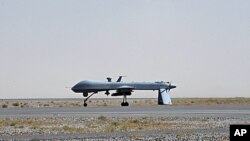Yemen's new transitional government is facing an emboldened al-Qaida presence, and the United States and others have pledged to help fight them. But after a year of political unrest, they face an uphill battle.
The U.S. has long helped Yemen in the fight against al-Qaida in the Arabian Peninsula, providing training, equipment and armed drones for counter-terrorism efforts.
But some in Yemen see foreign help as simply interference. Sana'a resident Mohamed Mohie el Din says Yemenis want to protect themselves. That is how Yemen has always been, in his words, the graveyard of the invaders.
Most galling have been the civilians deaths in U.S. drone strikes, the worst - 40 people killed in a mistaken attack in 2009. But there is a painful trade-off. Many Yemenis oppose al-Qaida and do not want Yemen seen as a haven for terrorists.
Political analyst Nasser Arrabyee says as regrettable as the civilian casualties have been, the strikes have also served their purpose.
"Sadly, because we didn't want these things to happen, but in terms of al-Qaida, without the drones, al-Qaida would have taken at least half of Yemen," noted Arrabyee.
Some drones have hit their mark, killing the influential American-Yemeni Anwar al-Awlaki last year and Abdel Monem al-Fathani, tied to the 2000 USS Cole bombing, last month.
Despite the losses, al-Qaida has thrived in the unrest of the past year. In some areas, their rule has been harsh, beheading suspected traitors, even crucifying one man.
But in other places, they have been welcomed. Arrabyee recalls a visit last week to the al-Qaida-held town of Zinjibar, where residents told him they do not share the extremists' ideology.
"I told them why don’t you fight al-Qaida? They said 'Why should we? Why should we fight al-Qaida while we are being ignored by the government and by everyone?" Arrabyee asked. "They give us some services, some public services, why should we fight them?'"
He argues that while the U.S. presence might help in the air, there is much more work to be done on the ground.
More Than Drones Needed to Fight Yemen's al-Qaida









